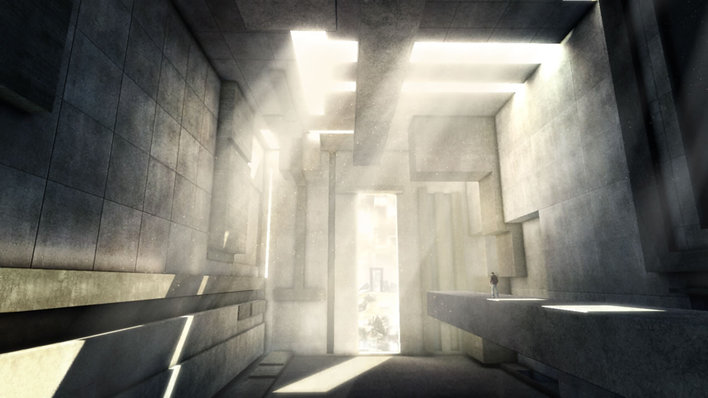We don't know about you guys, but here at Everybody Plays, there's nothing that sucks us into a game like a good story. Promising an equal blend of swashbuckling and stealth set in 16th Century Europe, which is in the midst of yet another of the continent's great overhauls, wrapped in a twisting storyline, we'd heard nothing but good things about Assassin's Creed: Revelations, so it was with more than a slight sense of anticipation that we stuck the disc into our tray. But my, how surprised we were.
You see, if you're a newcomer to the series, we'd recommend you don't, under any circumstances, start your journey into the series with Revelations. It'll make about as much sense as a chocolate teapot doing the hula. To attempt to sum up the long and winding story in a nutshell - having fallen into a coma, present day protagonist Desmond Miles discovers that his mind is broken, and the only way to fix it is to relive the stories of his ancestors, Ezio Auditore da Firenze and Altair ibn La'Ahad. In order to do this, you'll make use of a strange computer program/virtual reality-type thing, called the Animus, and although there's some sort of overarching storyline about how (we think) your memories are being used by some scientist, for reasons we're not entirely sure, but as we mentioned before, it's very confusing. In the confines of the Animus' computer simulations, you play as Ezio on his journey around Constantinople to discover more information about Altair, another assassin, who may know something about the Apple of Eden, which, as far as we can gather, is some sort of all powerful artifact. Tied into the social and political turmoil that rocks Constantinople (as it's currently in the middle of a Muslim take over, turning it into modern-day Istanbul), Ezio sets off on a quest to locate five keys to unlock the door to Altair's library, where he hopes to find out the true purpose of the Assassins - something which their sworn enemies, the Templars, would also like to know.
In traditional Assassin's Creed style, Revelations sees you exploring a huge, historically-inspired city filled with towering spires, huge domed palaces and formidable city walls, all of which the ever-nimble Ezio can scale effortlessly, as he goes about his business. Stealth is the name of the game here for the titular Assassins, as plenty of your missions will involve tracking, distracting or often eliminating your targets. As the forth and (supposedly) final instalment in the pretty popular series, it should, at least in theory, also sum up the long and winding stories of Desmond and his ancient ancestors Altair and Ezio from the previous three games...

Weeeeeeeeeeeeeeeeeeeeeeee!
Most missions, particularly early on, seem to either involve following someone around the city while they tell you about stuff, or taking out a bunch of guards on your way to knocking off your main target - and the ones that don't are obscure, badly explained affairs that result in many, many deaths along the way. The first road block we hit was a couple of hours in, where we were tasked with eliminating a Templar Commander who'd been put in charge of the former Assassin hideout they'd taken over. As an Assassin, it was your job to take out the commander, and reclaim the hideout. But while hunting down and killing a single person sounds easy enough, in reality, it wasn't. Travelling through the streets was a no-no, as as soon as you came within a certain distance of a group of guards, they'd attack you on sight, regardless of whether you'd actually done anything wrong - somehow, they instinctively knew you were up to no good. Which was rather annoying, as that's certainly not how it'd work in real life. Even if you somehow managed to reach the commander unseen, the moment you laid a finger on him, you were swarmed by thousands of guards and killed - we didn't seem to have the option to stealthily assassinate him, so it's no wonder a loon waving a sword around attracted some attention. Given the through-the-streets plan wasn't working, we tried going over the rooftops instead, although that proved just as fatal, thanks to the rooftop riflemen, who seemingly never miss a shot. Eventually, some dozen attempts later, we managed to somehow kill the commander through a combination of the two routes - strolling through the streets, we quickly got spotted, and managed to somehow evade a bunch of guards and find a non-patrolled roof top, from which we could jump down and assassinate the Templar Commander before anyone noticed. It was luck more than skill that resulted in his demise, in all honesty.
Later on came another quest - but this time, it wasn't quite as clear what we were supposed to be doing. The story goes that someone in the district is trying to get the Thieves Guild arrested by bribing the guards and tipping them off, and it's up to Ezio to find out where the money is coming from. The general idea is to steal the bribe from a guard, causing the guard to then send an urgent message back to the benefactor, which you hope will lead you straight to him. In order to do this, we were under the impression we had to use our hired group of thieves to lure some guards away from a chest, and steal the treasure inside - but again and again, we'd end up in a fight with the guards and BAM! Dead and having to restart the mission because the target was lost, with no explanations of what actually went wrong - the unopened chest, which we assumed was our target, was in plain view. It turns out you're not actually meant to get into a fight with the guards, but just get your band of thieves to lead them away from the chest (the game hadn't actually told us that we had to lock onto the group of thieves, yet alone issue orders to them) - we eventually learnt that by tapping LT, we could send our thieves in to lead the guards away. After they've headed off, you'll see one of the thieves return to loot the chest, which a guy who's been randomly standing nearby takes as his cue to leave - scanning the crowds with Ezio's patented Eagle Vision highlights the ne'er do well, and off you trot after him to find out where the bribery money is coming from.

So many of the early quests involve walking round town after Yusef....
A game can be the best thing since sliced bread, but if it's controls are so complicated/awkward that you can't actually play it, then no-one's going to stick with it long enough to see the end. Assassin's Creed: Revelations' controls aren't terrible by any means, but they're far more complicated and clumsy than they really need to be - when you need to dedicate more than a third of the manual to button combinations (even if the manual is less than 10 pages), then things are probably a tad more complex than they need to be. In simple terms, you have two main categories of moves depending on whether you want to keep a low profile, blend in and (hopefully) not get attacked by every single group of guards patrolling the city, and a set of high profile moves for running and jumping over rooftops and attacking anyone who gets in your way. Four moves are mapped to the A, B, X and Y buttons on the controller, and holding RT switches from the default low profile actions to the more extreme high profile ones.
The problem comes when, as we found out, holding down one of the buttons can have unexpected consequences - while in low profile and holding the A button to walk faster through the streets of Constantinople, we wondered why we seemed to be mysteriously earning money as we passed through crowds. On further inspection, it turns out that holding the A button while next to a person pickpockets them, so in our attempts at getting to our destination on the other side of town a little bit quicker, we'd actually lightened the purses of the people of Constantinople considerably - something which one crazy old woman was not to pleased about, proceeding to stalk me all the way round town, punching and kicking me whenever she got a chance. Somewhat bizarrely, no guards noticed this.
That instance, though, was about the only time the guards turned a blind eye to what we were up to. In a game which is as much about exploring the streets as assassinating people, the way Assassin's Creed: Revelations limits your movements seems almost absurd. Getting ambushed by the guards for minding your own business quickly gets frustrating, and when you head onto the rooftops to hide for a bit, only to get shot by a rifleman with pinpoint precision, you kind of wonder why you're bothering.
Around the city, you and your other assassin friends have various strongholds known as Assassin Dens, that the Templar guards will attack if you manage to gain enough notoriety. When one of these dens is under attack, you enter the 'Den Defence' mini-game, which sees you commanding assassins from the rooftops, placing barricades and the like to slow down the assault and basically preventing them from getting to your den at the end of the alleyway. It all seems fine as you get your troops to fight through wave upon wave of Templar soldiers, but the final wave usually brings with it a huge armour-plated battering ram thing that runs right over all your barricades, and takes an awful lot of hits to defeat - often resulting in a failed mission...
Scattered around the Constantinople streets and rooftops are Animus Data Fragments, little silvery orby things that you can collect to unlock extra levels that delve into test subject Desmond's memories. A bit like a poor man's Portal, these levels see you imprisoned in a series of grey blocky rooms armed with nothing but the ability to summon a selection of blocks out of thin air, which can then be used to traverse the various chasms while Desmond waffles on about some obscure thing from his childhood. It may not sound that bad, but trust us, first person platforming, with moving blocks, and areas where you can't actually build blocks for seemingly no apparent reason is even less fun that it sounds - and when you've wondered round for the best part of a decade because the Animus can't afford sign posts and got sick and tired of Desmond's waffle about a farm, it's not fun any more.

Don't even go there...
Assassin's Creed: Revelations isn't necessarily a bad game - just a rather confusing one. If you enjoyed the other entries in the series, the odds are you'll enjoy this one too, seeing as not an awful lot has changed, but for newcomers Revelations forms an impenetrable wall of button combinations, convoluted quests and a nonsensical story. If you've never picked up a game before, we'd highly recommend starting from the first one, which does a much better job of explaining things than this. If you've played the first one, though, or simply have the patience of Mother Teresa, feel free to add an extra two points onto the score.
Format Reviewed: Xbox 360


















